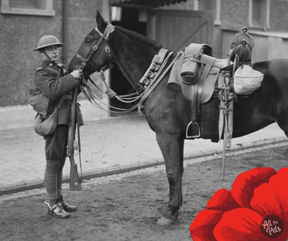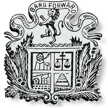Johnstone History Museum
Johnstone History Society • Scotland
World War I |
August 31, 2019 |
War Horses
August 31, 2019

Typical WWI soldier with cavalry horse.
Thanks to Steven Spielberg’s movie War Horse most people are now aware of the part played by the horse during WW1.
In the first few weeks of the conflict the Army requisitioned around 120,000 horses from the civil population. Owners who could not prove that their horses were needed for essential transport or agricultural duties had to surrender them and were given payment at set rates.
It was the job of the Remount Department and Army Veterinary Corps to get them into shape and ready for active service. Horses purchased for the Army had to meet certain criteria. A horse had to be over 3 years old , healthy and the right size for the work they were purchased for to do - either for riding, pulling guns or transport.
The War Office decided that no horse under 15 hands high would be recruited. A horses height was measured from its withers (the top of its shoulders) with a special stick. The Remount Depot at Maryhill Barracks, Glasgow received those horses so purchased in the Glasgow and West of Scotland area, which included Johnstone.
Thomas Gillespie, the farmer and carting contractor of Springfield Farm, Overton Road, Johnstone, behind the High Railway station, early in the war came across two suspicious gents dressed in civilian suits, measuring up his horses in the nearby field near the house. He asked what they were up to and they said that they were Government purchasing agents and were going to take 2 of his horses. Tom Gillespie chased them off his property, but they later returned with the police , who advised him that it was quite lawful for them to do so, and the 2 horses not required for essential Farm use were taken away.
It was reported in the Pollokshaws Advertiser (1915) that it was a common sight to see long lines of horses being led to Glasgow to be entrained south then shipped to France.
After the war was over, large numbers of surplus army horses were sold off by the military at public auction back to the civilian population.
The man responsible for overseeing the sale of those army horses in Scotland was Lieutenant Colonel William C. Middleton (late of the Royal Scots Greys), Assistant Director of Remounts, Headquarters, Scottish Command, Edinburgh, with Remount Depots also at Maryhill, St. Boswells and Ayr.
The following newspaper article is typical of the period which appeared in the Yorkshire News, Jan. 14th 1919 -
Sales of Surplus Army Horses.
Glasgow - Messrs Macdonald, Fraser & Co., 15th Jan. 1919, about 90 horses.
St. Boswells - J. Swan & Sons, 30th Jan. 1919, 15 horses,of these 6 are of the Hunter type.
Edinburgh - J. Croall & Sons, 23rd Jan.1919, about 70 horses.
(Signed) William C. Middleton, Lt.Colonel, D.A.D.R.,
Scottish Command, Edinburgh, 10.1.1919.
The Courier, Thursday, April 10, 1919 -
Special Sale of Army Horses at Glasgow.
Macdonald, Fraser & Co.Ltd, held yesterday a special sale of 101 surplus army horses within their Horse Bazaar, Reidvale Street, Glasgow. These horses comprised a few heavy draught horses, which met keen competition and sold dear.
In the lighter class where the quality was good , high prices were also realised. A few saddle cobs sold well. Best heavy draught horses, £36 10s to £60. Cobs £29 10s to £44.
The Yorkshire Evening Post, Thursday, April 3, 1919
Demobilising the Army Horses. Over 158,000 Already Sold.
The sale of surplus army horses and mules is expected shortly to come to an end. The disposal of these animals has been proceeding in the different theatres of war for some months and 168,274 horses and 42,325 mules have found buyers. The total sums realised being £5,961,075 and £1,546,598.
The highest price for both classes were obtained in Italy, where horses averaged £75 14s 4d, and mules £52 12s 10d. Salonika being second for mules with £47 8s 9d. The average for the United Kingdom were £34 14s 4d and £17 15s 11d respectively.
Press reports of July 18 1919 reported that the Remount Depot at Maryhill Barracks was now closed.
Numbers of horses returned from France to the U.K. also included captured German ones.
Thomas Gillespie, Springfield, Johnstone went to one of these sales and purchased two horses.
Right away he noticed a problem with them as they did not seem to understand basic commands.
A soldier let him in on the secret. They were captured German horses and didn’t understand English. He showed them a few German commands and the problem was solved.
In the first few weeks of the conflict the Army requisitioned around 120,000 horses from the civil population. Owners who could not prove that their horses were needed for essential transport or agricultural duties had to surrender them and were given payment at set rates.
It was the job of the Remount Department and Army Veterinary Corps to get them into shape and ready for active service. Horses purchased for the Army had to meet certain criteria. A horse had to be over 3 years old , healthy and the right size for the work they were purchased for to do - either for riding, pulling guns or transport.
The War Office decided that no horse under 15 hands high would be recruited. A horses height was measured from its withers (the top of its shoulders) with a special stick. The Remount Depot at Maryhill Barracks, Glasgow received those horses so purchased in the Glasgow and West of Scotland area, which included Johnstone.
Thomas Gillespie, the farmer and carting contractor of Springfield Farm, Overton Road, Johnstone, behind the High Railway station, early in the war came across two suspicious gents dressed in civilian suits, measuring up his horses in the nearby field near the house. He asked what they were up to and they said that they were Government purchasing agents and were going to take 2 of his horses. Tom Gillespie chased them off his property, but they later returned with the police , who advised him that it was quite lawful for them to do so, and the 2 horses not required for essential Farm use were taken away.
It was reported in the Pollokshaws Advertiser (1915) that it was a common sight to see long lines of horses being led to Glasgow to be entrained south then shipped to France.
After the war was over, large numbers of surplus army horses were sold off by the military at public auction back to the civilian population.
The man responsible for overseeing the sale of those army horses in Scotland was Lieutenant Colonel William C. Middleton (late of the Royal Scots Greys), Assistant Director of Remounts, Headquarters, Scottish Command, Edinburgh, with Remount Depots also at Maryhill, St. Boswells and Ayr.
The following newspaper article is typical of the period which appeared in the Yorkshire News, Jan. 14th 1919 -
Sales of Surplus Army Horses.
Glasgow - Messrs Macdonald, Fraser & Co., 15th Jan. 1919, about 90 horses.
St. Boswells - J. Swan & Sons, 30th Jan. 1919, 15 horses,of these 6 are of the Hunter type.
Edinburgh - J. Croall & Sons, 23rd Jan.1919, about 70 horses.
(Signed) William C. Middleton, Lt.Colonel, D.A.D.R.,
Scottish Command, Edinburgh, 10.1.1919.
The Courier, Thursday, April 10, 1919 -
Special Sale of Army Horses at Glasgow.
Macdonald, Fraser & Co.Ltd, held yesterday a special sale of 101 surplus army horses within their Horse Bazaar, Reidvale Street, Glasgow. These horses comprised a few heavy draught horses, which met keen competition and sold dear.
In the lighter class where the quality was good , high prices were also realised. A few saddle cobs sold well. Best heavy draught horses, £36 10s to £60. Cobs £29 10s to £44.
The Yorkshire Evening Post, Thursday, April 3, 1919
Demobilising the Army Horses. Over 158,000 Already Sold.
The sale of surplus army horses and mules is expected shortly to come to an end. The disposal of these animals has been proceeding in the different theatres of war for some months and 168,274 horses and 42,325 mules have found buyers. The total sums realised being £5,961,075 and £1,546,598.
The highest price for both classes were obtained in Italy, where horses averaged £75 14s 4d, and mules £52 12s 10d. Salonika being second for mules with £47 8s 9d. The average for the United Kingdom were £34 14s 4d and £17 15s 11d respectively.
Press reports of July 18 1919 reported that the Remount Depot at Maryhill Barracks was now closed.
Numbers of horses returned from France to the U.K. also included captured German ones.
Thomas Gillespie, Springfield, Johnstone went to one of these sales and purchased two horses.
Right away he noticed a problem with them as they did not seem to understand basic commands.
A soldier let him in on the secret. They were captured German horses and didn’t understand English. He showed them a few German commands and the problem was solved.
